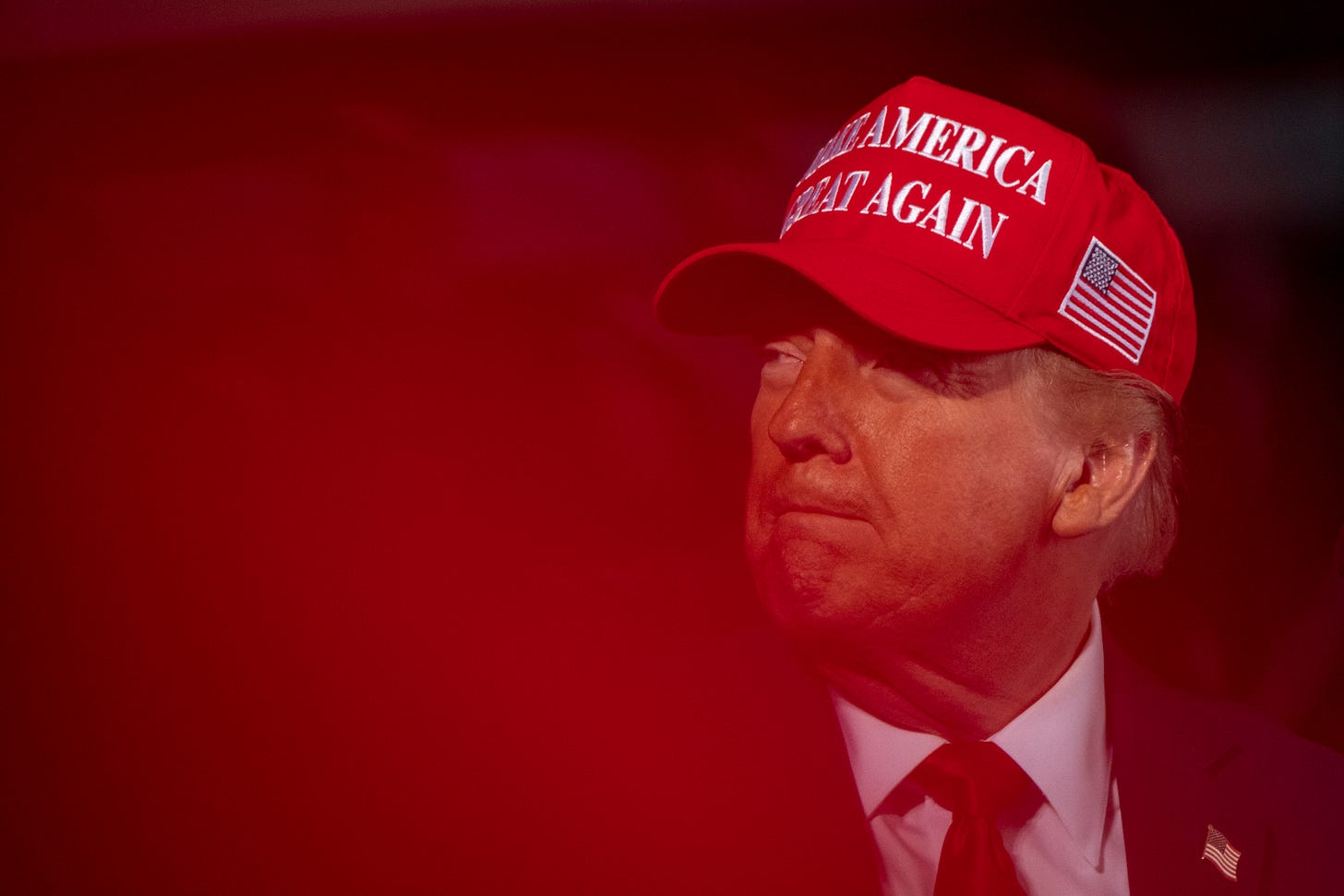Donald Trump’s Plan B
Here’s how he’s already laying the groundwork for contesting an election loss.

“IT DOESN’T MATTER IF YOU WON OR LOST THE ELECTION. You still have to fight like hell.” That is, according to Special Counsel Jack Smith’s recent evidentiary filing in his case against Donald Trump for the January 6th insurrection, what Trump said at a crucial moment in 2020. That was his plan then—and all signs indicate that it is his plan now.
There’s nothing normal about Trump’s campaign this year. Even the standard features—the rallies, fundraising, and ads—are dominated by appalling lies, conspiracy theories, and grotesque exploitation of fear and xenophobia. Case in point: On Monday, Trump quintupled down on his earlier hateful messaging that immigrants are “poisoning the blood of our country”—language straight from Mein Kampf—by telling conservative broadcaster Hugh Hewitt that immigrants bring the “bad genes” of murderers.1
Running alongside Trump’s out-in-the-open campaign is the political Plan B that he and his allies are quite clearly pursuing. It’s a strategy that we can piece together from reliable reporting and Trump’s own ever-escalating unhinged threats and rants. It involves setting the stage right now for trying to overturn the vote if he loses so he can grab power anyway.
In other words, there’s an obvious reason Trump has repeatedly refused to say he would accept the election results if he loses: Just as in 2020, he’s ready to “fight like hell” to overturn his defeat.
There’s a method to his madness. Trump and his allies are (1) softening the public’s belief in the legitimacy of election results ahead of time by hammering the message that the election will be rigged; (2) abusing the courts with pre-election lawsuits as a launching pad for the claim that he was the real winner; and (3) inciting anger among his followers—including perhaps armed militants eager to turn to violence—should he suffer election defeat.
The good news is that there’s an antidote. As John Pitney, a political scientist and Never Trump conservative, recently wrote:
Trump will almost certainly refuse to accept defeat. But if he loses big in the popular vote, as well as losing the electoral vote, it will be harder for him to claim that he is the people’s choice. The larger the margin, the weaker his claim.
Simply put, every vote matters, even outside the swing states.
Let’s look at each of the three parts of Trump’s strategy.
1. Normalizing the idea that Trump won what he lost.
Trump is the sorest loser in American history. Refusing to accept election results and saying that an election was “stolen” from him are among the oldest moves in his playbook. In 2016, after his Iowa primary loss, Trump tweeted, “Ted Cruz didn’t win Iowa, he stole it.”
Sound familiar?
Later that year, he preemptively sowed distrust by tweeting this about an election he expected to lose: “The election is absolutely being rigged. . . . SAD.” And after he prevailed, he falsely boasted: “In addition to winning the Electoral College in a landslide, I won the popular vote if you deduct the millions of people who voted illegally.”
Months before Election Day 2020, Chris Wallace asked Trump if he would accept the election results. The then-president answered: “It depends.” He said he’d “have to see.”
And of course, once he lost, he began to push his Big Lie that the election was stolen by ballot fraud, tried to interfere with the certification of Joe Biden’s win, and set loose violence upon Congress and the nation on January 6th.
Jack Smith’s evidence details how Trump was repeatedly told by insiders that his claims could not be proven. Trump’s response: “The details don’t matter.” What does matter for propagandists untethered from truth is repetition of falsehoods. The message is the medium.
The same is true this time around: On October 1, when a reporter asked Trump if he would trust this year’s election results, he responded: “I’ll let you know in 33 days.” The day before, when a CBS reporter asked the same question, Trump answered: “If I see that we had a fair and free election.”
Trump is clearly desensitizing us to the notion that defeated candidates should not accept their losses so that power transfers peaceably. The man shows us over and over again that he cannot tolerate the idea of being a loser. Last go-around, he mounted a coup trying to prove he hadn’t lost. It failed, but now, emperor’s-new-clothes style, he forces all his Republican allies to agree that he really won—or, in House Speaker Mike Johnson’s case, to be too scared to admit he lost.
This time, Trump is even more desperate than in 2020 because he’s been indicted. He needs the shield of presidential immunity from the trials and potential prison time that await him unless he is elected. So he’s working overtime to get not just his supporters but also the press and the wider public to shrug off the post-election denialist threat as just Trump being Trump.
In fact, the real threat would come from that collective shrug. We need to vote in blue states and red in such volume that his margin of defeat by a popular majority makes his loss impossible to deny.
2. Pre-election abuse of the courts.
The Republican National Committee has filed more than a hundred pre-election lawsuits aiming to disenfranchise voters more likely to cast their ballots for Kamala Harris and other Democrats than for Trump and his tribe.
They may win some cases before Trump-appointed judges they’ve shopped for. Mainly, though, they have been on a losing streak, likely to continue with cases like one in Nevada state court where they flimsily allege that the Democratic secretary of state is not doing enough to keep immigrant noncitizens from voting.
That case illustrates the key point: There is a propaganda value to court cases creating media narratives that can raise questions about election processes. The value is that if Trump loses, he can point even to frivolous cases his allies lost, claim they were wrongly decided and say that he would and should have won the election had the courts ruled properly.
And then, lying in wait, there’s the Supreme Court and its right-wing majority, ready to raise Trump from the dead if he loses. An overwhelming margin of defeat can make that resurrection too heavy a lift. Every vote matters.
3. Inciting violence.
You might be wondering why Trump has of late been leaning ever harder into insanity on the campaign trail. Maybe he just can’t help himself. Maybe it’s accelerating mental degradation associated with aging and the stresses of campaigning.
But it serves a strategic end: riling up his most extreme supporters to enlist their violence if he loses.
You know about his bizarro September 10 debate statements about Haitian immigrants—here legally, by the way—eating dogs and cats. That led to bomb threats, hateful emails and phone calls, evacuated government buildings, and closed schools to keep children safe.
Trump returned to the theme that immigrants threaten the American way of life at a September 30 rally in Erie, Pennsylvania: “Thousands of migrants from the most dangerous countries are destroying the character of small towns and leaving local communities in anguish and in despair.”
Then there was Trump’s call-in on Monday to Hugh Hewitt’s show where Trump unsubtly blamed Vice President Harris for deluging the country with criminals from Mexico and Central America:
How about allowing people to come through an open border, 13,000 of which were murderers . . . and they’re now happily living in the United States?
Back in reality, statistics show unequivocally that immigrants commit far less crime than citizens. And that border crossings are at a four-year low.
Last month, Trump claimed that the way to stop crime—which dropped dramatically last year—is an unconstrained police brawl against citizens: “One rough hour, and I mean real rough, the word will get out and it will end immediately.”
Consider how Trump’s most violent followers will hear that message: Street violence is the way to solve problems, including the nonexistent problem of “replacing” white Americans with immigrant murderers who will poison the country’s gene pool.
A large popular-vote majority would do two important things: discourage many from joining in violence as they might in a close election, and bolster the forces of law and order in quickly bringing any such violence to an end. Running up Trump’s margin of defeat seems the surest route to keeping the peace and protecting our democracy.
Correction (10 a.m. EDT Oct. 10): An earlier version of this article misquoted Trump. He has described immigrants as “poisoning the blood” of the country, not “spoiling the blood.”





